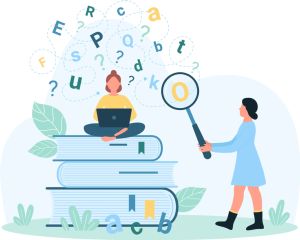
Dyslexia is a learning disorder that affects an individual’s ability to read due to difficulty identifying speech sounds and their relation to written letters and words. It is one of the most common learning disorders - estimated by some as affecting 20% of the population - yet often goes undiagnosed and unaddressed, especially in teens and adults. However, dyslexia is considered a disability under the ADA that should receive reasonable accommodations. Here, we’ve assembled some resources that advocate for people with dyslexia and that can help you and your dyslexic students get the accommodations they need.
International Dyslexia Association
The International Dyslexia Association (IDA) is a non-profit organization devoted to serving individuals with dyslexia, their families, and professionals. The IDA offers a wealth of information about dyslexia, including handy fact sheets, infographics, and success stories. They offer a free dyslexia handbook that, though geared primarily toward families, contains a great deal of useful information for educators. The IDA also has a directory of providers throughout the country, resources for teacher preparation and CERI (Center for Effective Reading Instruction) certification, and guides for supporting dyslexic students in the classroom. The IDA also organizes conferences and workshops, including the IDA Annual Reading, Literacy, and Learning Conference – AKA DyslexiaCon, coming this October.
The Yale Center for Dyslexia & Creativity
The Yale Center for Dyslexia & Creativity (YCDC) seeks to increase awareness of dyslexia and to emphasize the creative and intellectual strengths of those with dyslexia. A prominent leader in dyslexia research, the YCDC provides resources and tools for students with dyslexia, including articles on college planning and tips from fellow dyslexic students. For educators, their resources are split into two categories: instruction and school culture. The instruction category contains information on accommodating dyslexia, while the school culture category contains information on ensuring that dyslexic students feel accepted and included. The YCDC also offers advocacy resources like their guide to talking about dyslexia, a social media toolkit, an educational one-pager, and more.
Dyslexic Advantage
As one of the largest online dyslexia communities and a nonprofit 501(c)(3) organization, Dyslexic Advantage provides a wide range of resources for educators and parents of dyslexic individuals. The educators’ course shares methods for meeting dyslexic students’ needs, understanding their challenges and strengths, and utilizing various tools and strategies for learning. Dyslexic Advantage also offers a course meant to specifically empower dyslexic individuals to explore and pursue STEM fields, and a helpful list of the best (and worst) colleges for dyslexic students. Many of Dyslexic Advantage’s resources are free, but some – including their courses and their magazine – require payment.
DyslexiaHelp at the University of Michigan
DyslexiaHelp was founded in 2009 at the School of Education at the University of Michigan and is led by ASHA-certified speech-language pathologist and educator Joanne Marttila Pierson, Ph.D. DyslexiaHelp aims not only to help individuals with dyslexia, but also to help employers, educators, and other professionals who work with dyslexic people gain greater understanding about the disability. Their website offers resources for dyslexic individuals, including resources about self-advocacy, college, and employment, as well as resources for professionals that help to support student strengths, develop teaching strategies, offer professional development, and more. DyslexiaHelp also shares success stories, and routinely publishes articles about leading research, so you can always stay up-to-speed on the latest in dyslexia news.




 See More Feature Articles
See More Feature Articles